One in four autistic adults, and one in three autistic women, reported at least one psychiatric diagnosis, obtained prior to being diagnosed with autism, that was perceived as a misdiagnosis. Inaccurate diagnoses are linked to long diagnostic pathways and delayed recognition of autism, both of which are major contributors to autistic womens’ poor mental health and lower qualities of life.
Awareness of autism in women is a huge part of this, and that’s why I think advocacy and sharing experiences is so important.
Delayed diagnosis means many autistic women blame themselves for finding life difficult to manage. This can lead to low self esteem, a greater chance of developing other mental health conditions, anxiety, and missed opportunities. In one study of women who weren’t diagnosed with ADHD or autism until adulthood, many participants reported feeling like they were “wrong” and didn’t fit in anywhere. Others even went as far as trying to change their clothes or personality to better fit in. But after diagnosis, participants felt they better understood why they might feel the way they do and felt a greater sense of personal value after receiving their diagnosis.
While diagnosis can sometimes have a negative affect – with some women fearing they may be discriminated against, that others may think badly of them or that people will look down on them – most of the time, receiving the right diagnosis makes women feel empowered and have a better quality of life.
Why are women not being diagnosed?
There are two main drivers to this. Firstly, autism and ADHD symptoms present differently in women to men; The Female Phenotype Theory asserts that autistic males and females express autistic traits differently. For example, autistic women tend to have fewer repetitive behaviours, greater levels of anxiety, are more likely to have varied special interests in different subjects to autistic men (these topic areas can be seen as more socially acceptable, such as a music artist, or crafts), and are more likely to seek friendships, and have sensory issues (particularly introception issues).
Unfortunately, autism and other neurodiverse spectrum “disorders” are still often seen as “male disorders”, and though it’s true that these conditions affect a higher proportion of men than women, the the current tools used to diagnose people with these conditions tend not to recognise female symptoms as readily.
Secondly, women with autism and ADHD may also learn over time how to hide their symptoms from people – which may further lead to misdiagnosis or delayed diagnosis. Masking is when autistic individuals hide or compensate for their autistic traits to appear more “normal” and fit in with others. Masking significantly predicts suicidal behaviours in autistic individuals and positively correlates with depression and anxiety. Constant self-monitoring (conscious or not) and adapting to social situations with different people all day is exhausting, and can lead to feelings of self hatred.
Moving on from delayed diagnosis, the other issue I want to highlight is misdiagnosis. Because autistic women present autistic traits differently and don’t get support, they often develop mental health conditions, they may recieve a diagnosis of other psychiatric conditions, and the autism then goes unnoticed. These can include anxiety, depression, or personality disorders. The conditions can overshadow autism, leading to a missed diagnosis. This, in turn, can lead to inappropriate treatments and further distress, as the wrong support is given and reasonable adjustments aren’t provided, and most importantly, the individual doesn’t understand and accept themselves.
Sometimes autistic women may simply recieve a wrong diagnosis, when their autistic traits are misinterpreted as a mental health condition – again, this results in potentially damaging and distressing treatments, a lack of actual support, and blaming oneself.
In my mind, early diagnosis of autism in females is crucial. Delayed diagnosis and misdiagnosis affect autistic womens mental health and access to services. They are isolating and invalidating. We need women to feel empowered, to be happy, to be able to lead fufilled lives with confidence.
I think partly this can be achieved simply by raising awareness and sharing experiences, but we also need changes in research and policy. The significant gap in research on autistic women and girls results in insufficient education among doctors, therapists, and other healthcare professionals. Policies also need to reflect the unique needs of autistic women so they are supported – just because autistic womens needs are different to autistic men doesn’t mean they don’t need support. I was previously considered ‘high functioning’, which is a term often applied to autistic women, but this completely minimised any difficulties I faced, and stopped me from getting much-needed support.
As I finish writing this, I feel I’ve been very reptitive – and then I reflect on why this is. And it’s because all these factors all keep leading to, for autistic women, the same, very sad conclusion: little to no support or understanding.
Research used:
https://www.ncbi.nlm.nih.gov/pmc/articles/PMC9666868/
https://www.ncbi.nlm.nih.gov/pmc/articles/PMC5925757/
https://autism.org/gender-differences-in-diagnoses/
https://www.durham.ac.uk/research/current/thought-leadership/women-with-autism–adhd-arent-diagnosed-until-adulthood/
https://www.ncbi.nlm.nih.gov/pmc/articles/PMC11001629/
(right click and open image in new tab to see these infographics larger!)
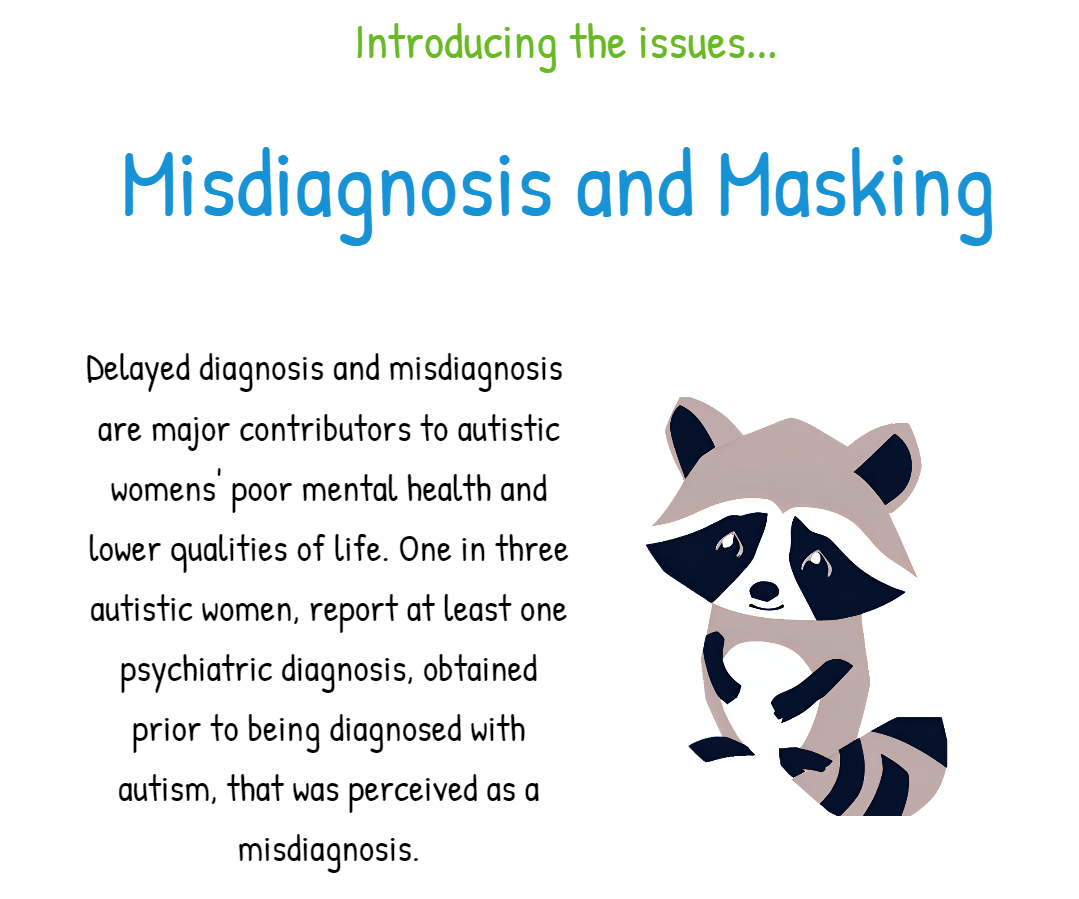
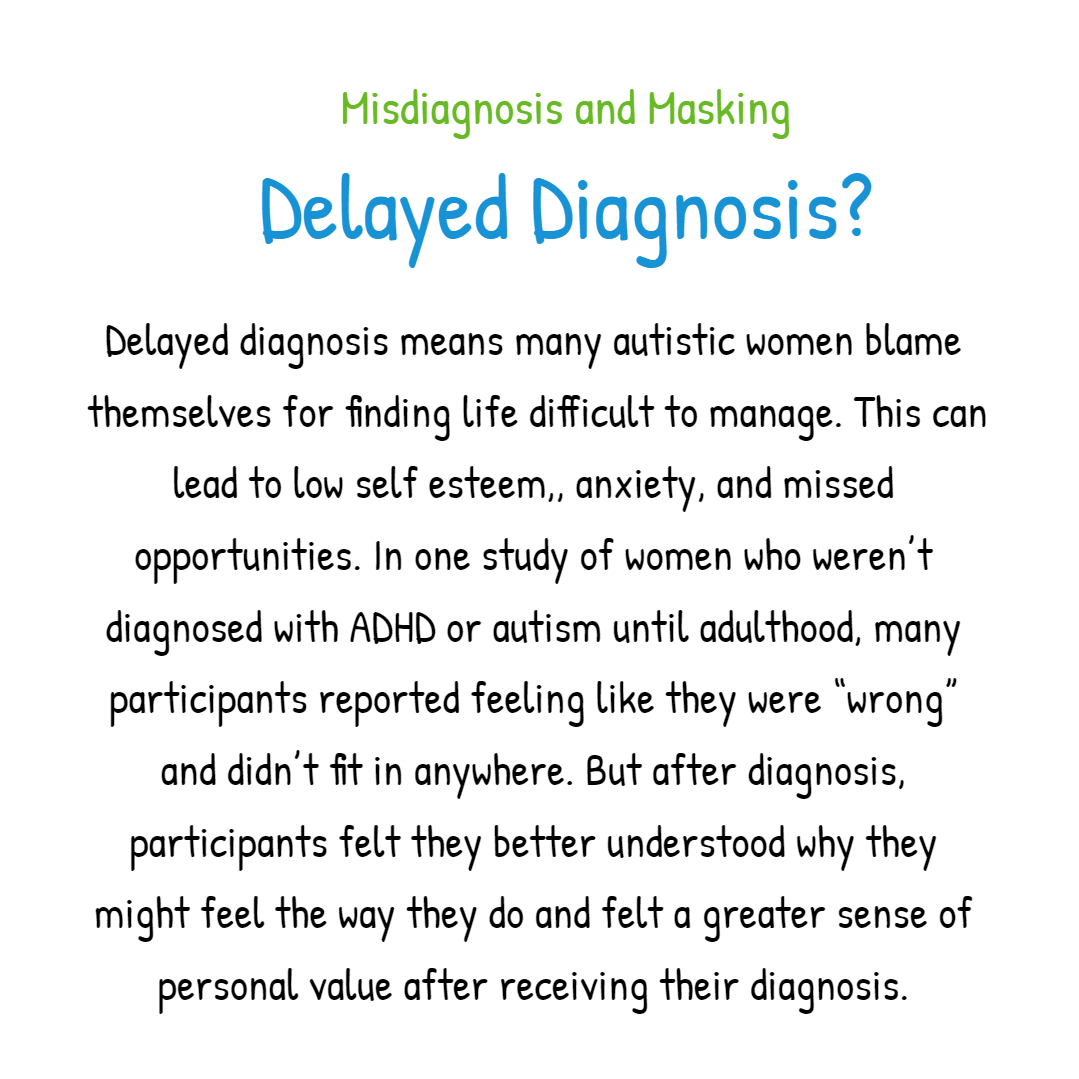
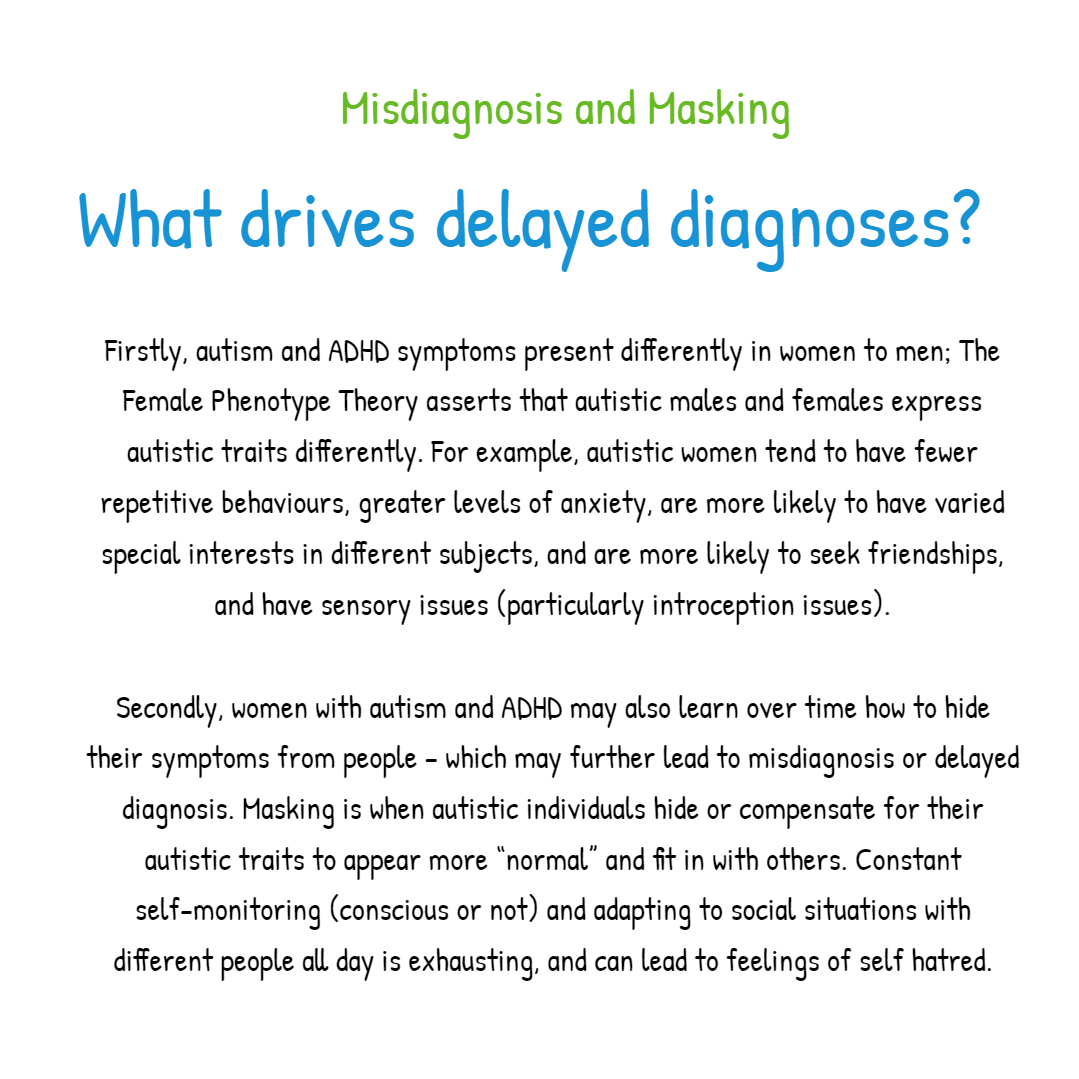
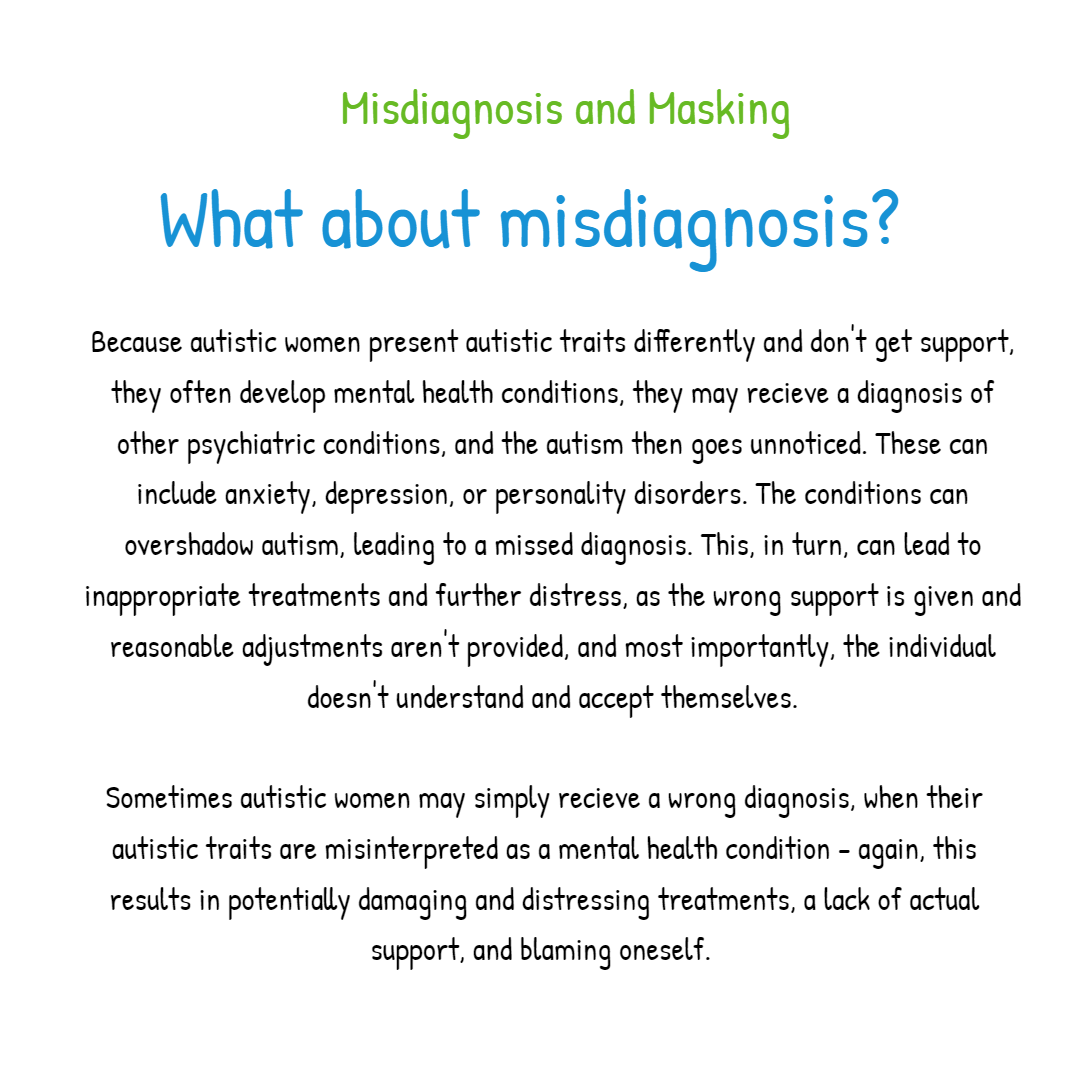
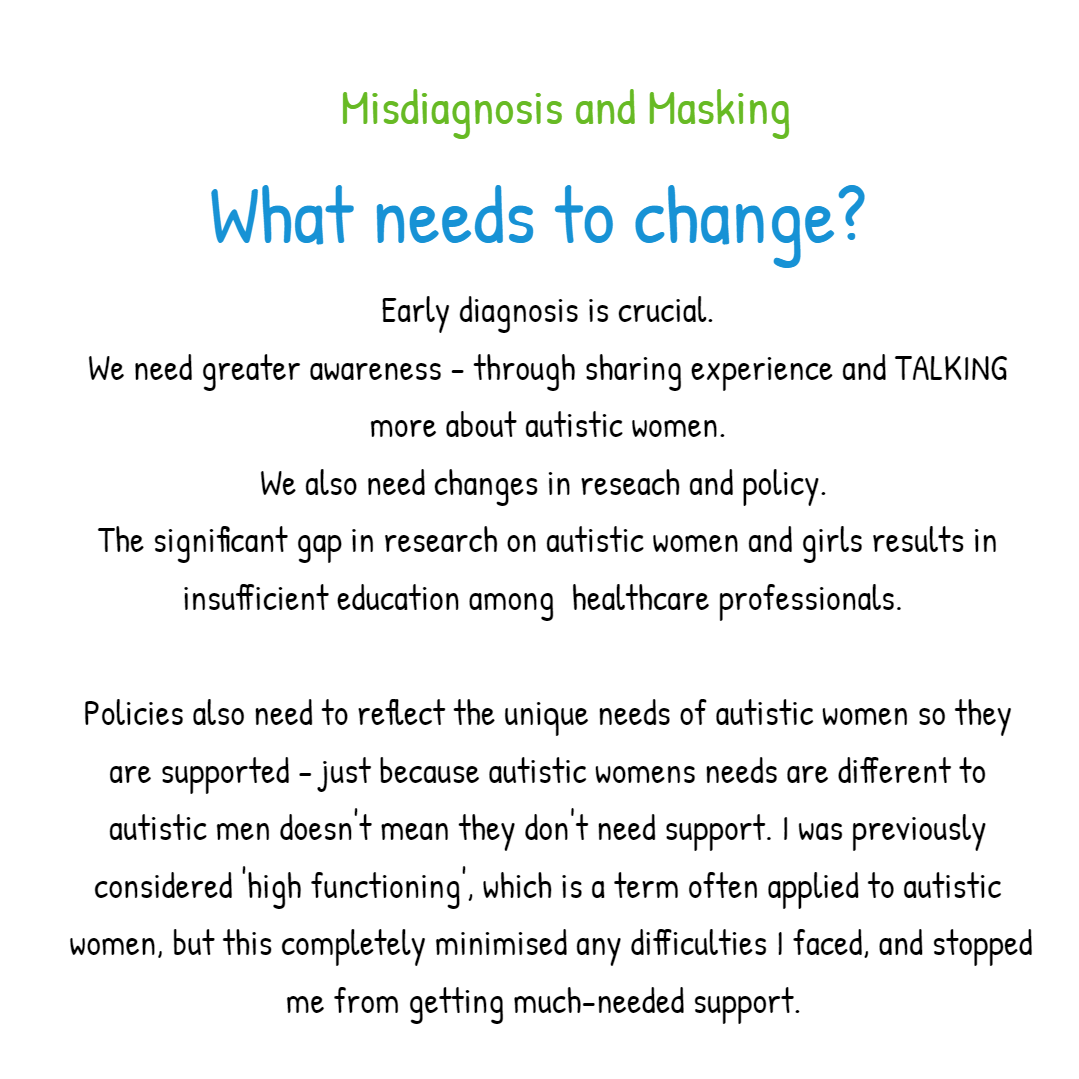
Leave a Reply